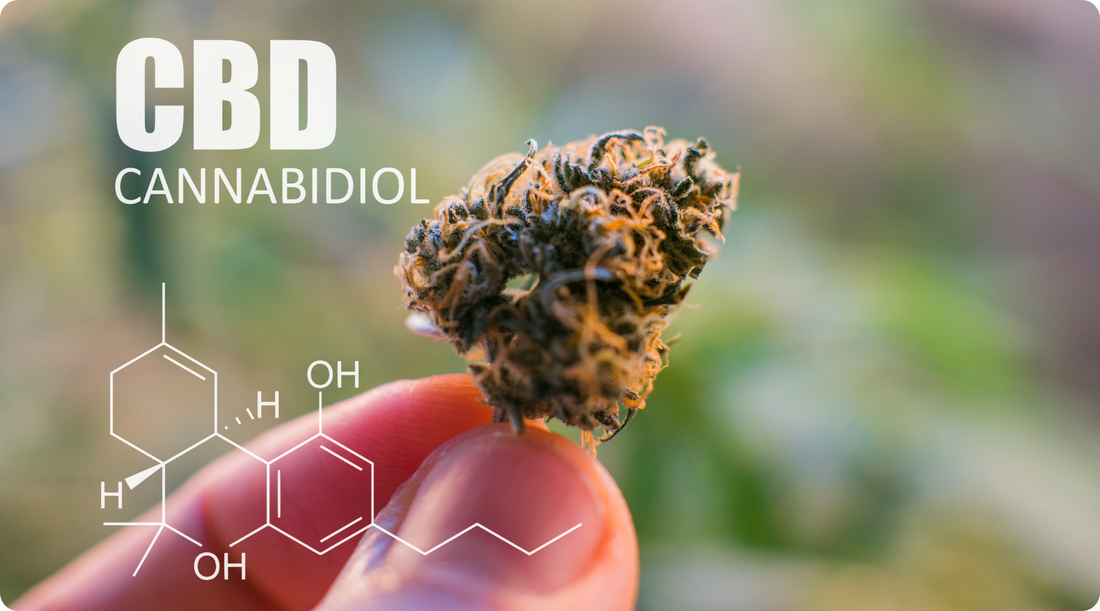
What is CBD? A Comprehensive Guide to Cannabidiol
Share
In recent years, CBD (cannabidiol) has gained widespread attention for its potential health benefits, becoming a go-to natural remedy for various conditions. Whether you’ve seen it infused in oils, edibles, topicals, or even skincare products, CBD has quickly become one of the most talked-about compounds in wellness circles.
But what exactly is CBD? How does it work, and what are its potential benefits? In this comprehensive guide, we'll explore everything you need to know about CBD, including how it differs from THC, its effects on the body, and its therapeutic uses.
What is CBD?
CBD (cannabidiol) is one of over 100 naturally occurring compounds found in the cannabis plant. These compounds, known as cannabinoids, interact with the human body's endocannabinoid system (ECS), which helps regulate various physiological processes like mood, pain, sleep, and immune response.
Unlike THC (tetrahydrocannabinol), the well-known psychoactive cannabinoid in marijuana, CBD is non-psychoactive. This means it does not produce the "high" commonly associated with cannabis use. As a result, CBD has become popular among individuals seeking the therapeutic benefits of cannabis without the mind-altering effects of THC.
CBD is typically derived from hemp, a variety of the cannabis plant that contains very low levels of THC (less than 0.3%). Hemp-derived CBD products are widely available and are legal in many parts of the world.
How Does CBD Work?
CBD interacts with the endocannabinoid system (ECS), a complex cell-signaling system that plays a critical role in regulating several important functions, such as:
- Pain
- Mood
- Appetite
- Sleep
- Immune response
The ECS is made up of three key components:
- Endocannabinoids: Naturally produced cannabinoids in the body.
- Cannabinoid receptors: Found throughout the body, particularly in the brain and immune system. There are two main types: CB1 receptors, primarily in the brain, and CB2 receptors, mostly in the immune system.
- Enzymes: Responsible for breaking down cannabinoids once they’ve carried out their function.
While THC binds directly to CB1 receptors in the brain, producing psychoactive effects, CBD doesn’t bind directly to these receptors. Instead, it influences the body’s endocannabinoid system indirectly, promoting balance and homeostasis without producing a high.
Potential Benefits of CBD
Research into the potential therapeutic effects of CBD is still ongoing, but early studies and anecdotal evidence suggest that CBD may offer a wide range of benefits. Some of the most commonly reported uses of CBD include:
1. Pain Relief
One of the most well-known uses of CBD is for its pain-relieving properties. CBD is believed to reduce inflammation and interact with neurotransmitters involved in pain signaling. As a result, it is often used by people with conditions like chronic pain, arthritis, and fibromyalgia.
Studies have shown that CBD may help manage both nociceptive pain (caused by physical injury) and neuropathic pain (caused by nerve damage). Unlike prescription pain medications, CBD is not addictive and does not produce the side effects commonly associated with opioids.
2. Anxiety and Stress Relief
Another popular use of CBD is for managing anxiety and stress. CBD has been shown to interact with serotonin receptors in the brain, which play a key role in mood regulation. By influencing these receptors, CBD may help reduce symptoms of anxiety, promoting a sense of calm without the psychoactive effects of THC.
Studies suggest that CBD may be effective in reducing social anxiety, generalized anxiety disorder (GAD), post-traumatic stress disorder (PTSD), and even panic attacks. Many people also use CBD to help with sleep, as it can promote relaxation and reduce insomnia related to anxiety.
3. Anti-Inflammatory Properties
CBD is widely recognized for its anti-inflammatory effects, making it a popular choice for individuals suffering from conditions like inflammatory bowel disease (IBD), arthritis, and other autoimmune disorders.
By interacting with the immune system, CBD may help regulate the body’s inflammatory response, reducing the symptoms of chronic inflammation. This anti-inflammatory effect is also why many athletes and fitness enthusiasts use CBD for muscle recovery and post-workout soreness.
4. Neuroprotective Benefits
Preliminary research suggests that CBD may have neuroprotective properties, meaning it could help protect brain cells from damage and support brain health. This has led to growing interest in CBD as a potential treatment for neurodegenerative disorders like Alzheimer’s, Parkinson’s, and multiple sclerosis.
Additionally, CBD has shown promise in reducing seizures in individuals with certain types of epilepsy. In fact, Epidiolex, a CBD-based medication, has been approved by the FDA to treat Dravet syndrome and Lennox-Gastaut syndrome, two severe forms of epilepsy.
5. Skin Health
CBD is increasingly being used in skincare products due to its anti-inflammatory and antioxidant properties. It may help treat acne, eczema, and psoriasis by reducing inflammation and regulating the production of sebum (oil) in the skin.
CBD’s antioxidant effects may also protect the skin from damage caused by free radicals, helping to slow down signs of aging and improve overall skin health.
How to Use CBD
There are several ways to consume CBD, depending on your preferences and the effects you’re seeking:
-
CBD Oil/Tinctures:
- CBD oil is one of the most common forms of CBD. It can be taken sublingually (under the tongue) for fast absorption or added to food and drinks.
-
Capsules and Edibles:
- CBD capsules, gummies, and other edibles offer a convenient and discreet way to consume CBD. However, they take longer to take effect as they must pass through the digestive system.
-
Topicals:
- CBD creams, balms, and lotions are applied directly to the skin and are ideal for targeting localized pain or skin conditions.
-
Vaping/Smoking:
- Inhalation offers the fastest effects, making it a popular option for people seeking immediate relief. CBD can be inhaled through vape pens or smoked in its flower form.
-
CBD Isolates:
- CBD isolate is the purest form of CBD and can be consumed on its own or mixed into oils and edibles.
Is CBD Safe?
CBD is generally considered safe and well-tolerated, with few side effects. Some people may experience mild side effects like fatigue, dry mouth, or changes in appetite. These effects are usually minor and temporary.
However, it’s important to speak with a healthcare provider before starting CBD, especially if you are taking other medications. CBD can interact with certain medications, including blood thinners, so professional guidance is recommended.
Conclusion
CBD is a versatile and natural compound that offers a wide range of potential health benefits, from pain relief to anxiety management to neuroprotection. As research into CBD continues to grow, more people are turning to it as a non-psychoactive alternative to traditional medications.
Whether you’re seeking relief from chronic pain, stress, or inflammation, CBD may offer a natural solution to support your wellness journey. As always, consult with a healthcare professional to ensure that CBD is right for your individual needs.
Disclaimer:
This article is for informational purposes only and is not intended as medical advice. Always consult with a healthcare provider before starting any new supplement or treatment, including CBD.
